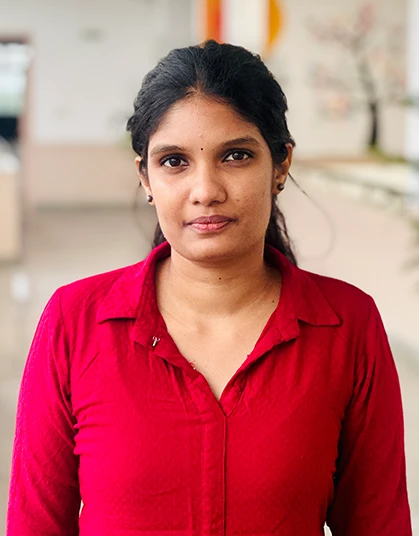
Haritha A
Assistant Professor
Department of Chemistry
GITAM School of Science
Bengaluru
Education
Ph. D.
 hasha@gitam.edu
hasha@gitam.edu
Social Media
 LinkedIn
LinkedIn
Dr Haritha holds a PhD in Theoretical and Computational Chemistry from Università degli Studi della Campania “Luigi Vanvitelli” in Napoli, Italy with Marie Sklodowska-Curie Fellowship and a BS-MS dual degree in Physical Sciences from the IISER Mohali as INSPIRE fellow. Further she did her postdoctoral research at IBB-CNR, Napoli. Her research focuses on developing novel computational strategies to study photophysics of MCAs such as DNA, Photosystems and optoelectronic systems.
Research Publications
- Asha, H, Green, JA, Esposito, L, Santoro, F, Improta, R. Computing the electronic circular dichroism spectrum of DNA quadruple helices of different topology: A critical test for a generalized excitonic model based on a fragment diabatization. Chirality. 2023; 1- 13.
- Asha H, Green JA, Esposito L., Martinez-Fernandez L, Santoro F, Improta R. Effect of the Thermal Fluctuations of the Photophysics of GC and CG DNA Steps: A Computational Dynamical Study. J.Phys. Chem. B 2022, 126, 50, 10608–10621.
- Asha H, Green JA, Martinez-Fernandez L, Esposito L, Improta R. Electronic Circular DichroismSpectra of DNA Quadruple Helices Studied by Molecular Dynamics Simulations and Excitonic Calculations including Charge Transfer States. Molecules. 2021; 26(16):4789.
- Asha H, Stadlbauerb P, Martinez-Fernandez L, Banas P, Sponer J, Improta R, Esposito L. Early steps of oxidative damage in DNA quadruplexes are position-dependent: quantum mechanical and molecular dynamics analysis of human telomeric sequence containing ionized Guanine. Int. J. Biol. Macromol. 2022, 194:882–894
- Green JA, Asha H, Santoro F, Improta R. Excitonic Model for Strongly Coupled Multichromophoric Systems: The Electronic Circular Dichroism Spectra of Guanine Quadruplexes as Test Cases. J Chem Theory Comput. 2021;17(1):405-415.
Ongoing Research Projects
-
Develop Excitonic models to predict the spectra and Dynamics of MCA systems involving Charge transfer, Charge Recombination (CR) and Charge separation.
-
Incorporate machine learning and AI algorithms to enhance model building for MCAs, which can effectively reduce the computation cost.
-
Explore more about DNA-Ligand interactions and Molecular Docking
Expertise
-
Computational Chemistry
-
Quantum Chemistry
-
Molecular Spectroscopy





